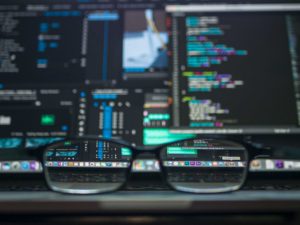If you’ve been following the news lately, you’ve probably read about the boom in Artificial Intelligence (AI). Some of the advances have elicited responses ranging from amazement to fear. So why has so much attention been diverted to AI recently? Advances in this technology over the past decade have surprised even experts in the field, and it has been spurred in part by cheaper and faster computing power as well as greater availability of large datasets. AI isn’t some futuristic technology that threatens to change our lives in the distant future, it has already changed our lives in many ways since its inception 60 years ago. Contrary to what many fear, however, it has not yet reached the point of surpassing human capabilities.
Definition and Scope of AI
The portrayal of problematic AI is pervasive in the film industry and can often be misleading. For a technology so widely discussed in popular culture, there’s no consensus on what it actually is. Stanford University’s 100-year study of AI defines it as “activity devoted to making machines intelligent, and intelligence is that quality that enables an entity to function appropriately and with foresight in its environment.” This definition may explain why my calculator isn’t intelligent, but what about my iPhone? It seems the key is that AI achieves specific goals through methods parallel to human intelligence. Most progress in AI today is within specific subfields like machine learning and deep neural networks, which has enabled the next generation of speech-recognition on the Amazon Alexa or the facial-recognition on the new iPhone X. Future uses of AI include autonomous self-driving cars, diagnostic healthcare and several other applications that we don’t yet have the foresight to predict. According to experts, AI doesn’t have the capabilities that match human intelligence but it does have the ability to process massive amounts of data and learn from it in ways humans can’t. With increasingly available big data and cheap computing power, it won’t take long for us to train computers to make extremely accurate weather predictions, find new drug targets, or mine complex biological datasets in a fraction of the time that humans can. AI is being tested on games like Go, Jeopardy and Dota 2 as a low-risk way to improve its algorithm and to demonstrate the human-like abilities of this technology.
Benefits and Drawbacks

In 2015, Stephen Hawking, Elon Musk and several other scientists and intellectuals signed an open letter on artificial intelligence, specifically calling for more research on the potential impacts of AI on society. While they discuss several potential benefits of AI, scientists are also wary of the pitfalls and the possibility of losing control of autonomous AI. They believe that the rapid development of AI could threaten to shift society in ways similar to the industrial revolution or the creation of the atomic bomb; inventions that forever changed the social and economic landscape of the world. Another concern is the displacement of humans by robots in many fields. What kinds of jobs will become obsolete? This process of new technology getting rid of certain jobs is nothing new, but it could happen at a higher frequency. Therefore, more research is required to understand how the integration of new AI would affect certain industries.
Should we trust it?
There is no turning back from the future of AI. However, we as a society can engage on how we want to live amidst this increasingly powerful technology. During the past few decades, with the rise of social media, smartphones and cybersecurity issues, technological advancements have already forced us to think about the intersection of humanity and technology. Many scientists and intellectuals warn that AI is more advanced than anything we’ve ever dealt with. Therefore, healthy skepticism is warranted, but not so much that it hinders progress and inspires fear. The US is currently at the forefront of AI research, with China and Russia close behind. The technology is undergoing rapid progress so tighter regulation may slow research down. The existing technological hurdles gives society time to determine what roles we want AI to play in our lives. Some believe that this technology is merely an extension of human values and that our intentions will determine what our future with AI looks like. While this might be slightly naive, I believe that with the proper regulation set in place, we can make a better world more integrated with advanced technology.
Organizations Involved in A.I. Research and Outreach
- Future of Life: A volunteer-run organization aimed at mitigating the existential risks to humanity from advanced AI.
- OpenAI: An organization founded by Elon Musk to discover a path towards safe AI
- Intelligence & Autonomy: A research organization funded by the Ethics and Governance of Artificial Intelligence Fund to “provide nuanced understanding of emerging technologies and to inform the design, evaluation, and regulation of AI-driven systems.”
- Machine Intelligence Research Institute (MIRI): Aims to make intelligent systems behave in a manner that aligns with human intentions.
- Future of Humanity Institute (FHI): A multidisciplinary research institute that publishes on AI governance, safety and other issues like biotechnology to shed light on humanity’s long-term future.
- Stanford’s One Hundred Year Study on Artificial Intelligence (AI100): To anticipate the effects of AI through a century-long chain of standing committees, study panels and growing digital archive.
- National Science and Technology Council (NSTC): An executive branch advisory council released two documents highlighting comprehensive research and development plans for AI during the Obama administration (briefs for the Strategic plan and Preparation here). However, since this office has not been staffed under the new administration, it is unclear what steps will be taken by the government.
Peer edited by Gowri Natarajan.
Follow us on social media and never miss an article: